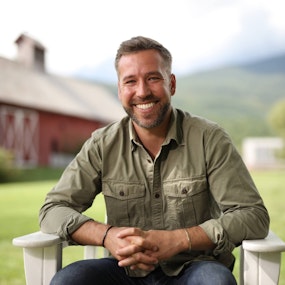Applying Growth Lessons to Hospitality - David Rust, Sagra

David Rust is the founder and CEO of Sagra, a hospitality business whose mission is to bring awareness to regenerative agriculture and support the farms that practice it.
David was one of the first 20 team members at Lyft, which achieved a $24 billion valuation at its IPO and was named to the Forbes 30 under 30 list. Yesterday we learned about why and how he's building Sagra to introduce more people to sustainable farming, and in this episode, you'll hear what he's learned about building companies that you can apply to your business.
Join the conversation on today's episode on the Hospitality Daily LinkedIn page.
Hospitality Daily isn't just a podcast! Every morning - Tuesday through Friday - I summarize the stories you need to know as a hospitality professional in a short email. Read today's issue and subscribe here.
Josiah: 0:00
David Rust was one of the very first employees at Lyft, which went on to achieve a $24 billion valuation at its IPO and was named to Forbes' 30 Under 30 list. Yesterday, we learned about the hospitality company he's starting to introduce more people to sustainable farming (Sagra). In this episode, you'll hear what he's learned about building companies that you can apply to your business.
David: 0:45
Starting a hospitality business is so different from starting a traditional tech venture business. I think we do need a lot more innovative models in hospitality. I would love to see many more hospitality startups, but you don't see them that often, I think for a good reason. You have these major hospitality brands. If you're trying to own real estate as a hospitality business, how do you go about raising the money to do that out of the gate? If you want to be a brand, how do you convince property owners to put your brand, which is brand new, on their product? These are very real barriers to having new hospitality businesses start. I do think, especially coming from having been at a venture studio background, that you can create an environment that can inspire creating new businesses. Even large hospitality brands could help set certain environments, pool funding together, and provide expertise to own parts of these new hospitality businesses just to get more out there. Otherwise, things start to get tired and old after a bit of time. It's like, okay, I love going to some of these well-known brands, but we need new, innovative models and it is quite difficult to start them. However, there are some very real ways we could make that easier.
Josiah: 2:08
What have you found useful from your time at Lyft and other venture-backed startups that you've applied now as a founder in building a hospitality company?
David: 2:20
The first and foremost thing is to rapidly test and iterate on things as you're going along and view everything as an opportunity to learn. Whether that's feedback from a guest, how your website works, or a confirmation email and how it can be tweaked, or a marketing message, constantly test and iterate. The other thing I think a lot about is how to make a brand well-known. Depending on the industry and space you're in, there are different models for that. With Lyft, having a pink mustache on the front of the car and sharing unique stories about drivers allowed us to get a lot of media attention. These days, we get the word out about Sagra mainly by telling the stories of the farmers. This not only drives people to visit those farms but also helps them learn about Sagra. This allows them to find other farms or maybe even inspires them to create locations on their own. Another big piece is that if you have some really interesting stories to tell, lean heavily on press, which can be a very cheap or free model. It also feels very authentic. You're not having to pitch people; you're just inviting them in.
Josiah: 3:33
What types of media have you found to be most effective toward achieving your goals?
David: 3:38
Honestly, a lot of broad lifestyle media has been effective. People who are looking to travel, people who are interested in food—showing up in places like Travel and Leisure magazine, the Wall Street Journal, or Sunset Magazine from a West Coast-focused view—those are perfect venues for people who are genuinely curious about travel and food.
Josiah: 4:01
Sunset loves you.
David: 4:04
You know what's funny? Sunset Magazine's original HQ, which isn't there anymore, was in Menlo Park. I remember driving by and being inspired because they would have these beautiful gardens out front. When Sunset first wrote about us, I thought it was amazing. I remember as a kid going to Sunset Magazine and walking through the gardens with my mom.
Josiah: 4:23
It's so funny. My cousins are from Menlo Park, and I would often go there with them and walk around the gardens. It was something we did frequently. It's so funny to watch this come full circle. It's such a California West Coast brand. But to your point about media, I think it's an important piece. It's both elements of the equation. Going back to your Lyft example, you had both the externally visible things like the pink mustache and the more meaningful, human-driven stories. You need to actually be doing interesting things; then, the best media publications will want to cover you.
David: 5:04
Right, because the way it works with media is that you can reach out and share stories, but the writers have to be genuinely interested. You can imagine how many pitches they get about new restaurant openings or new hotels. They're inundated with this information all day and have to decide what's actually worth writing about. What we've seen is that by telling very genuine stories about new farmers and new farms, we differentiate ourselves from, perhaps, a hospitality brand focused solely on new design or interiors. I'm not saying that's bad, but I think there's so much more opportunity for truly different experiences. For example, when you book a stay, what type of offering is it? Is it wellness-oriented? Are you aiming for something like Canyon Ranch, where it's all about deep health and wellness exploration? That's very different from any other type of experience out there. I just hope we keep seeing more and more of that.
Josiah: 6:23
If you saw the number of pitches I get every day about new openings or people being hired into new roles, you'd be shocked. More importantly, the community of Hospitality Daily doesn't care either. They care about interesting people doing interesting things, and that's why I wanted to talk with you. You're out there building something differentiated. Talking to you, I get the sense that while hospitality is deeply important to both of us, for you, there's something even bigger. You want to take care of the Earth, transform the lives of these people, and you're using hospitality as a way to do that. It's almost like a stage that you're performing on.
David: 7:06
Yes, I always love talking with friends about "Trojan Horse" business models. If you think about what we're doing as a Trojan Horse, it's like you book a stay through a very familiar booking flow. It looks somewhat like booking a hotel. You arrive at a beautiful place in nature, and then you read a guidebook talking about the health of the soil and how farming can mitigate climate change. You're reading about food in a different way, meeting a farmer, and then you leave thinking, "I got here because of hospitality, but that felt like a very different experience." It's all on their terms—none of this is being force-fed—but it has the opportunity to be deeply impactful for people. I love those Trojan Horse business models because I think change doesn't just happen; we need to create environments where people feel called to do things differently.

David Rust
CEO
David is the founder and CEO of Sagra, a hospitality business whose mission is to bring awareness to regenerative agriculture and support the farms that practice it. With a dad who grew up on a small farm in Germany, David was inspired at an early age by the beauty of farms and the prospect of growing food in a way that cares for the planet. Prior to Sagra, David was the 25th employee and Director of Strategy at Lyft where he oversaw the launch of Lyft's first markets and strategic initiatives. David was also named on the Forbes 30 under 30 list.
Most Popular Episodes
Check these out:





























